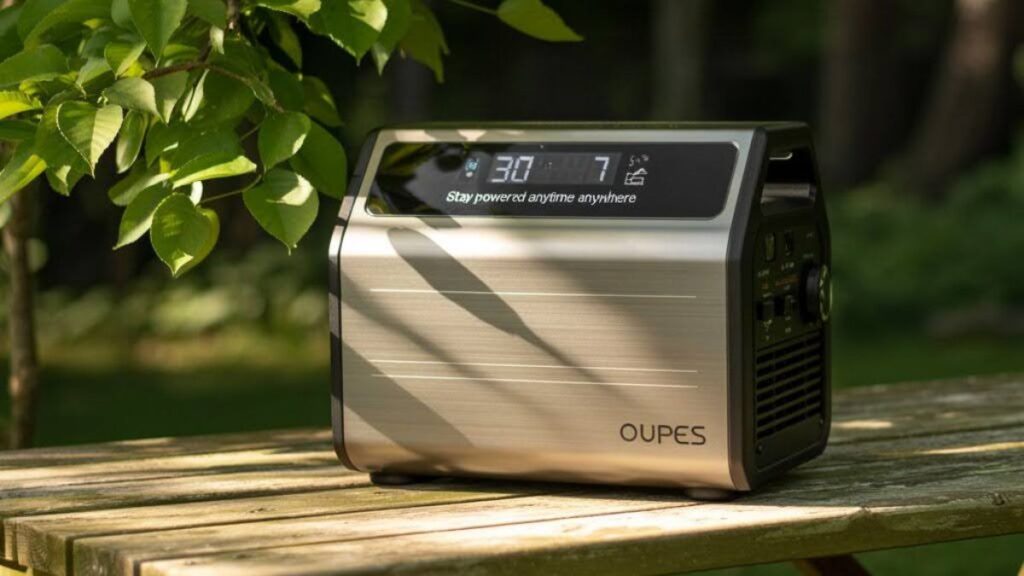In a world that runs on electricity, having access to backup power is no longer optional, it’s essential. Whether you’re dealing with an unexpected power outage, planning an outdoor adventure, or simply want peace of mind, two of the most effective solutions are the portable power station and the solar generator.
Both options deliver clean, quiet, and dependable power, but they serve slightly different purposes. Let’s break down how each works, their key advantages, and why OUPES has become a trusted brand for households and adventurers alike.
What is a Portable Power Station?
A portable power station is a compact, rechargeable unit that stores electricity and supplies it whenever needed. Unlike traditional gas generators, it doesn’t produce fumes, makes no noise, and is safe to use indoors.
Core Advantages of Portable Power Stations:
- Versatility – Equipped with AC, DC, and USB ports to run multiple devices simultaneously.
- Lightweight design – Easy to carry for road trips, camping, or daily use.
- Flexible charging options – Recharge via wall outlets, car adapters, or solar panels.
- Built-in protection – Advanced safety features prevent overheating, overcharging, and short circuits.
These units are ideal for keeping your phone, laptop, router, and even small appliances powered up whether you’re at home, traveling, or working on-site.
What is a Solar Generator?
A solar generator is similar to a portable power station but comes with the added benefit of harnessing sunlight for recharging. By connecting solar panels, you can continuously generate power without depending on the grid.
Key Benefits of Solar Generators:
- Sustainable energy – Powered entirely by the sun, making it eco-friendly.
- No fuel costs – Once you have the panels, the energy is completely free.
- Dependable outdoors – Perfect for areas without electricity, such as campsites or off-grid homes.
- Expandable systems – You can attach extra solar panels to increase capacity.
This makes solar generators especially appealing for campers, remote workers, and families committed to renewable living.
Portable Power Station vs Solar Generator: Which Do You Need?
Both solutions are practical, but your choice depends on your lifestyle and goals.
- A portable power station is best if you need something lightweight, quick to recharge, and affordable. It’s perfect for short blackouts, traveling, or running small devices daily.
- A solar generator is the better option if you spend a lot of time outdoors, live in a remote area, or want long-term savings through renewable energy.
Some users even combine both using a power station for everyday needs and a solar generator for extended off-grid power.
Why OUPES Stands Out
OUPES has quickly built a strong reputation by designing energy solutions that are powerful, durable, and user-friendly.
Here’s what makes their devices stand apart:
- High storage capacity for running essential appliances during long blackouts.
- Fast charging options through wall sockets, vehicles, or solar panels.
- Sturdy build quality designed for long-term use.
- Quiet performance so you can use them indoors or while camping.
- Wide range of models to suit different budgets and lifestyles.
Whether you need a compact device for weekend trips or a heavy-duty system for backup at home, OUPES offers a model tailored to your needs.
Step-by-Step Guide to Choosing the Right Backup Solution
- List Your Priorities
Decide if you need backup for just small electronics, or for larger appliances like refrigerators and medical equipment. - Check Power Ratings
Look at the wattage requirements of your devices. A fridge or CPAP machine will need more capacity than a phone or laptop. - Choose Between Mobility and Independence
- Pick a portable power station if portability and affordability are most important.
- Go with a solar generator if renewable, long-lasting energy is your main priority.
- Think About Budget
Power stations are usually cheaper upfront, while solar generators are an investment that pays off with free solar energy. - Plan for Growth
If you expect your energy needs to increase, select a system that allows for expansion with extra solar panels or batteries.
FAQs About Portable Power Stations and Solar Generators
- Can a portable power station keep large appliances running?
Yes, higher-capacity models can power refrigerators, TVs, and even medical devices for several hours. - How long does it take to recharge a solar generator?
This depends on the size of the panels and sunlight conditions. OUPES models are designed for faster solar charging compared to most brands. - Do these units work at night?
Yes. They store electricity during the day (or from wall charging) so you can use them anytime, including at night. - Are OUPES systems safe for indoor use?
Absolutely. They produce no fumes, no harmful emissions, and operate quietly. - How many years do these devices last?
With good care, OUPES units can provide reliable service for 5 –10 years or longer, thanks to durable battery technology. - Can I expand my system later?
Yes. Many solar generator models allow for adding more solar panels to increase power capacity. - Which is better for camping trips?
If it’s a short trip, a portable power station is enough. For longer adventures, a solar generator is the smarter choice. - Is investing in OUPES worth it?
Definitely. Compared to traditional gas-powered units, OUPES solutions are safer, cleaner, and more cost-effective in the long run.
Final Thoughts
Both the portable power station and the solar generator are excellent choices for backup power. Your decision depends on whether you value compact mobility or sustainable energy independence.
With OUPES, you’re not just buying a device, you’re investing in peace of mind, reliable performance, and clean energy for the future.






